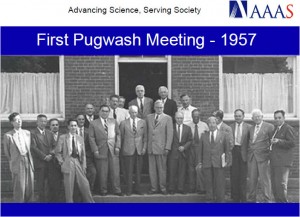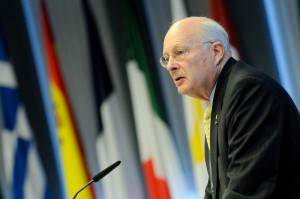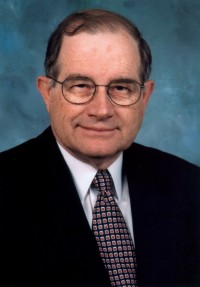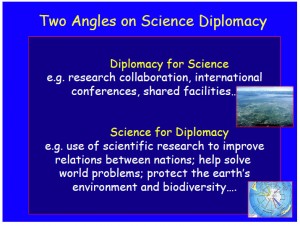During the cold war, some of the most important interchanges and breaking down of barriers between the east and the west came through scientific exchange and collaboration. In recent years, exchange and training of students, global availability of advanced scientific facilities, books and publications have broadened the scientific enterprise and have all contributed to the emergence of developing countries. As science advances around the world we can look more and more towards joint global scientific goals and facilities. In recognition of the importance of this subject, the American Physical Society (APS) sponsored a special session called “Science Diplomacy” during its April meeting in Anaheim, California, consisting of a panel of Norman Neureiter, Neal Lane and myself.

Pugwash Conferences on Science and World Affairs seeking elimination of nuclear weapons (Nobel Peace Prize 1995)
Nina V. Fedoroff, Science and Technology Adviser to the US Secretary of State and to the Administrator of the US Agency for International Development, has defined science diplomacy as “the use of scientific collaborations among nations to address the common problems facing 21st century humanity and to build constructive international partnerships.” She goes on to point out that “there are many ways and engineers to use their scientific and technical skills in the service of international diplomacy.” The APS session on science diplomacy illustrated the range of ways science and scientists can play these important roles.
The panel consisted of three speakers and included plenty of time for discussion with a lively interactive audience. The first panelist was Norman Neureiter, who has spent much of his career in hands-on science diplomacy, serving as the first science and technology adviser to the Secretary of State, leading the US’s international science and technology cooperation efforts under Secretaries Madeleine Albright and Colin Powell and has by his own actions helped define the term ‘science diplomacy’. At the APS meeting, Norman gave a broad sweeping talk, which he entitled “Science Diplomacy in Action.” He gave many concrete examples through his long history of his service from well-known events of his definition of science diplomacy as “the use of science cooperation as a means of active engagement with countries where overall relations are strained or non-existent. And, it is an instrument of a constructive foreign policy aimed at mutually beneficial engagement.” Norman is a living example as to how a single individual scientist can make a difference!
I was the second speaker and I talked on a subject familiar to most of our readers, “Science Diplomacy in Large International Collaborations.” I reviewed the ever-increasing reliance on international collaboration for large-scale science projects, including, of course, the International Linear Collider.
The third speaker was Neal Lane, who among his many roles has served as director of the National Science Foundation, Science Advisor to President Clinton and has been awarded the prestigious Public Welfare Medal by the National Academy of Sciences. He entitled his presentation “A Scientist’s Approach to Diplomacy – First, Listen and Learn.” Unfortunately, Neal’s trip to Anaheim was aborted due to an illness aboard his flight, but he was able to participate long-distance from Houston. In this talk, he emphasised from his many years of experience in the service of science in government that “science is a unique platform to promote cooperation, understanding and shared values among individuals, communities and nations even in difficult times.”
These talks were followed by a spirited question and answer discussion. Clearly, there is much interest by young scientists in participating as scientists in government. There are such opportunities and there is an obvious great need for more scientists to participate in government.
Finally, let me end by again quoting Nina Fedoroff, who so eloquently expressed the value and importance of scientists finding ways to “become citizens not just of our own nations, but of this world without borders. We need to see, experience, and identify with the peoples and the problems of other nations and to recognise the complexity and interconnections among the challenges facing 21st-century humanity. And perhaps most importantly of all, we need to understand, at a deep gut level, that all our fates are truly intertwined.”





Recent Comments